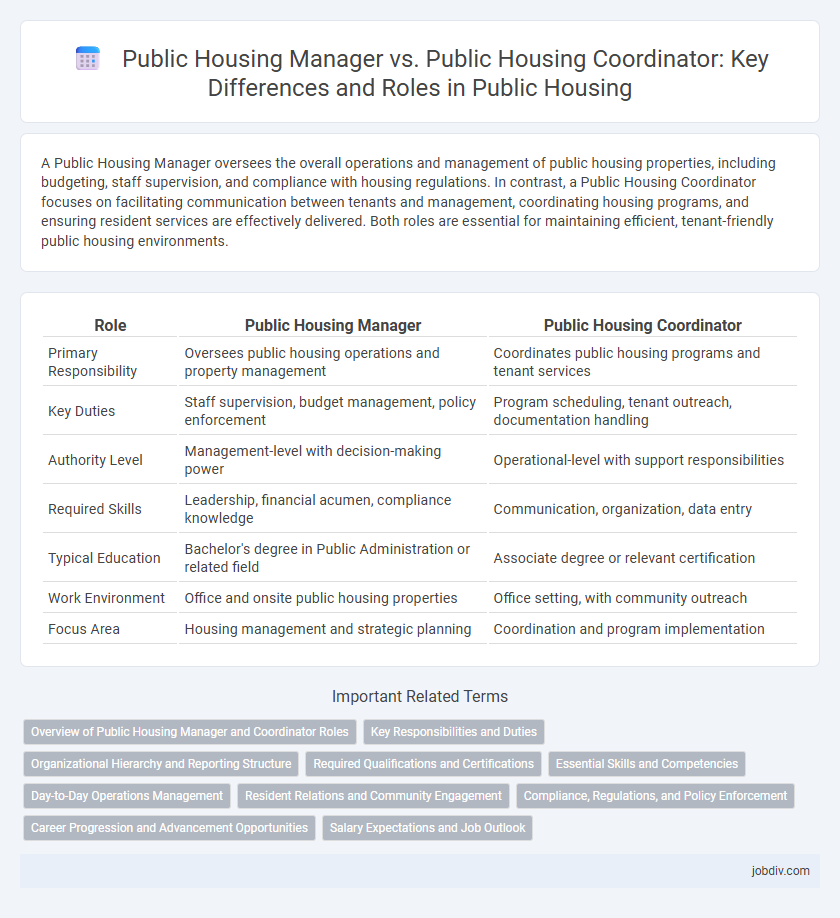A Public Housing Manager oversees the overall operations and management of public housing properties, including budgeting, staff supervision, and compliance with housing regulations. In contrast, a Public Housing Coordinator focuses on facilitating communication between tenants and management, coordinating housing programs, and ensuring resident services are effectively delivered. Both roles are essential for maintaining efficient, tenant-friendly public housing environments.
Table of Comparison
| Role | Public Housing Manager | Public Housing Coordinator |
|---|---|---|
| Primary Responsibility | Oversees public housing operations and property management | Coordinates public housing programs and tenant services |
| Key Duties | Staff supervision, budget management, policy enforcement | Program scheduling, tenant outreach, documentation handling |
| Authority Level | Management-level with decision-making power | Operational-level with support responsibilities |
| Required Skills | Leadership, financial acumen, compliance knowledge | Communication, organization, data entry |
| Typical Education | Bachelor's degree in Public Administration or related field | Associate degree or relevant certification |
| Work Environment | Office and onsite public housing properties | Office setting, with community outreach |
| Focus Area | Housing management and strategic planning | Coordination and program implementation |
Overview of Public Housing Manager and Coordinator Roles
Public Housing Managers oversee the daily operations of public housing facilities, ensuring compliance with federal housing regulations and managing tenant relations, maintenance, and budgetary functions. In contrast, Public Housing Coordinators primarily focus on program coordination, including managing applications, resident services, and community outreach to support tenant needs and improve housing accessibility. Both roles collaborate to maintain safe, affordable housing while addressing administrative and operational challenges within public housing programs.
Key Responsibilities and Duties
Public Housing Managers oversee the overall operation, maintenance, and administration of public housing facilities, ensuring compliance with housing policies and regulations. They manage budgets, staff, and tenant relations while coordinating large-scale housing projects. Public Housing Coordinators focus on tenant services, assisting residents with applications, addressing concerns, and coordinating community programs to improve living conditions.
Organizational Hierarchy and Reporting Structure
The Public Housing Manager typically holds a senior position within the organizational hierarchy, overseeing multiple housing projects and managing overall operations, budget allocations, and staff performance. Reporting directly to executive leadership or the Director of Housing, the Manager supervises Public Housing Coordinators, who handle day-to-day tenant services, compliance, and specific project coordination. This clear hierarchy ensures efficient communication flow and accountability in public housing administration.
Required Qualifications and Certifications
A Public Housing Manager typically requires a bachelor's degree in public administration, urban planning, or a related field, with certifications such as the Certified Public Housing Manager (CPHM) credential enhancing qualifications. In contrast, a Public Housing Coordinator often needs an associate degree or relevant experience, with certifications like the Housing Quality Standards (HQS) or HUD Section 8 Specialist credentials preferred. Both roles demand knowledge of housing regulations, compliance standards, and strong organizational skills, but the manager role emphasizes leadership qualifications and advanced certifications.
Essential Skills and Competencies
A Public Housing Manager excels in strategic planning, regulatory compliance, and budget management to oversee housing projects effectively, while strong leadership and decision-making skills are critical for managing staff and resources. In contrast, a Public Housing Coordinator emphasizes communication, organizational abilities, and problem-solving skills to facilitate tenant relations and coordinate between departments. Both roles demand knowledge of housing policies, proficiency in software systems, and a commitment to community development.
Day-to-Day Operations Management
A Public Housing Manager oversees the entire property's day-to-day operations, including tenant relations, maintenance scheduling, and budget management to ensure compliance with housing regulations. A Public Housing Coordinator focuses on coordinating specific activities such as occupancy processes, lease agreements, and resident services to support smooth daily workflows. Both roles are essential for efficient public housing management but differ in scope and responsibility levels.
Resident Relations and Community Engagement
Public Housing Managers oversee resident relations by addressing tenant concerns, ensuring compliance with housing policies, and facilitating community meetings to promote a harmonious living environment. Public Housing Coordinators focus on community engagement by organizing events, fostering partnerships with local organizations, and implementing programs that enhance resident participation and support services. Both roles collaborate to improve resident satisfaction and build strong, connected public housing communities.
Compliance, Regulations, and Policy Enforcement
Public Housing Managers oversee compliance with federal and local housing regulations, ensuring all policies are implemented effectively across housing projects. Public Housing Coordinators focus on monitoring adherence to specific policy guidelines and facilitating communication between tenants and regulatory bodies. Both roles collaborate to enforce regulatory standards but differ in scope, with managers handling broader policy enforcement and coordinators emphasizing detailed compliance tracking.
Career Progression and Advancement Opportunities
Public Housing Managers oversee the strategic operations and staff management of housing programs, offering broader leadership experience crucial for advancement into senior housing administration roles. Public Housing Coordinators typically handle daily program coordination and tenant services, gaining hands-on experience that serves as a foundational step for progressing into management positions. Career progression often involves moving from a coordinator role to managerial responsibilities, with opportunities to advance into regional or policy-focused roles within public housing agencies.
Salary Expectations and Job Outlook
Public Housing Managers typically earn higher salaries, averaging between $60,000 and $90,000 annually, due to their broader responsibilities in overseeing housing operations and budget management. Public Housing Coordinators generally earn between $40,000 and $60,000, focusing on tenant relations, program implementation, and compliance monitoring. The job outlook for both roles is positive, driven by increasing demand for affordable housing solutions and government initiatives aimed at urban development and community support.
Public Housing Manager vs Public Housing Coordinator Infographic

 jobdiv.com
jobdiv.com